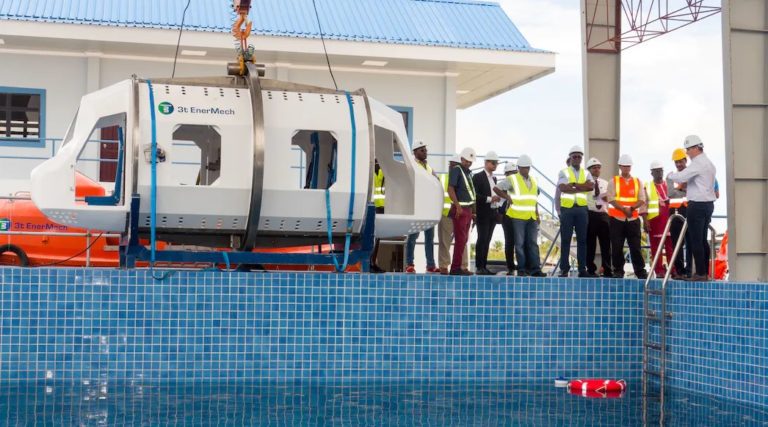OPITO sets a new benchmark for lifting standards in the region, with dedicated training centers in Guyana, Suriname, and Trinidad and Tobago.
OPITO, the global, not-for-profit skills authority, has brought its international lifting standards to South America, allowing operators in the region’s safety-critical industries to meet their obligations for running safe and compliant lifting operations.
Key lifting roles explained
Lifting is an essential skill in a wide range of safety-critical industries, including energy, logistics, ports, maintenance, and construction. An activity that involves moving loads and carrying hazards, lifting demands a competent and well-trained workforce.
OPITO fulfills this need in the South America region by supporting the delivery of lifting skills and competencies through two different frameworks:
- Banksman and Slinger
- Rigger
Delivered at approved training centers in Guyana, Suriname, and Trinidad and Tobago, these frameworks align with key lifting roles:
- Banksman – ensures loads are moved and positioned safely, directing crane or vehicle movements around worksites using hand signals or radio communication.
- Slinger – ensures loads are safely rigged for lifting, communicating with lifting teams using hand signals or radio communication.
- Rigger – prepares for and undertakes the safe lifting, moving, lowering, and landing of a load, using lifting equipment such as cables and pulleys.
Full framework, quality-assured training
Created in partnership with global energy industry stakeholders, OPITO’s robust lifting frameworks comprise:
- Initial Training
- Workplace Experience
- Competence Assessment
- Periodic Competence Re-Assessment
Learners are mentored and signed off by experienced personnel within their organization.
OPITO’s lifting training covers:
- The role of the Banksman and Slinger, or the role of the Rigger
- Principles of relevant lifting/rigging operations
- Understanding relevant lifting equipment and accessories
- Carrying out the relevant lifting operations
- Restoring the work area and post-operation responsibilities
- Relevant legislation and hazard control
- Best practices for communications and visibility.
Designed for both onshore and offshore working, and applicable to any safety-critical industry, OPITO’s standards offer a great deal of flexibility.
“It’s a full framework that’s been developed by industry for industry,” Product Development Manager at OPITO, Lucie Booth explained. “By investing in these standards, companies are implementing a clear training and competence path for their workers aligned with global industry expectations.”
To uphold that promise, OPITO adopts a rigorous approach to quality assurance. Its comprehensive approval criteria cover a training center’s:
- Management Systems;
- Equipment and Facilities;
- Staff Resources;
- Training and Assessment
- Health And Safety
“We audit our training centers to ensure the highest standards of safety,” OPITO’s Vice President Strategic Partnerships South America, Patrick Modolo said. “Ensuring that every center prioritizes the safety and well-being of our delegates throughout their training is our utmost priority.”
Invested in South America
Since Modolo’s appointment in August 2024, OPITO has continued to invest heavily in its presence in South America. Modolo engages with the industry to demonstrate how OPITO standards and qualifications can directly support their safety and performance goals.
With three new training centers approved in the last 12 months, OPITO is steadily expanding its South American network. “We’re fully focused on the region and we’re investing heavily in it,” Modolo said.
OPITO’s lifting frameworks are currently available in three locations in the Caribbean: Suriname, Guyana, and Trinidad and Tobago. OPITO has invested in the resources and infrastructure required to support its growing presence in South America. Many of its products and support videos for training centers are available in Brazilian Portuguese, with Spanish translations in progress.
Local capacity, international standards
While OPITO is focused on developing local capacity in South America, its products are globally recognized. “It doesn’t matter if workers undertake our lifting training in Trinidad and Tobago or in Malaysia, it will all be delivered to the same standard,” Booth explained. “This ensures both consistency and a minimum standard of lifting training and assessment across the industry.”
The global scope of OPITO’s products also presents an attractive prospect for employers. “Having an international standard allows operators to export services and enables a mobile workforce between countries,” Modolo noted. “If you’re a local company and you want to export your service globally, you can avoid duplicating your cost of training while ensuring your personnel continue their training and assessment with the relevant lifting framework.”
Find out more
As a safety-critical discipline, lifting demands comprehensive training and rigorous controls. With a dedicated local presence and an industry-recognized global framework that applies across sectors, environments, and regions, OPITO is set to ensure the highest levels of safety and skills in South America.
For more information, please visit www.opito.com



